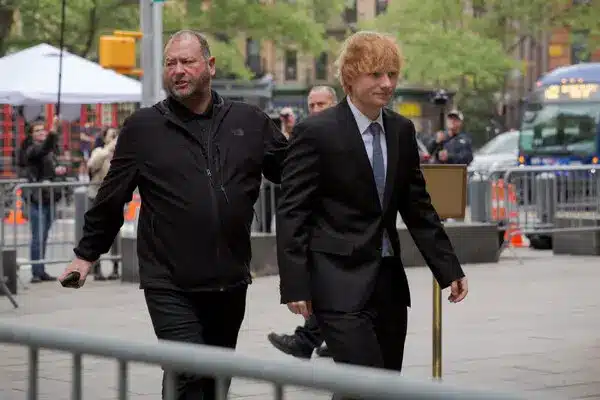Celebrity
Jury Finds Ed Sheeran Didn’t Copy Marvin Gaye Classic

NEW YORK – A federal jury in New York determined Thursday that British singer Ed Sheeran did not steal key elements of Marvin Gaye’s classic 1970s song “Let’s Get It On” when he created his hit song “Thinking Out Loud,” prompting Sheeran to joke later that he won’t have to follow through on his threat to quit music.
The emotions of an epic copyright battle that spanned most of the last decade erupted as soon as the seven-person jury announced its verdict after more than two hours of discussion.
Sheeran sighed and buried his face in his hands before embracing his attorney, Ilene Farkas. Sheeran smiled as the jurors filed out of the courtroom and mouthed, “Thank you.”
He then spent nearly ten minutes speaking with plaintiff Kathryn Townsend Gryphon, the daughter of Ed Townsend, who co-wrote the 1973 soul song with Gaye. They exchanged kisses and smiles.
Sheeran later spoke to media outside the courthouse, repeating his comment during the trial that if he lost the case, he would contemplate stopping songwriting.
“I am very pleased with the outcome of this case, and it appears that I will not have to retire from my day job after all.” But, at the same time, I am extremely frustrated that such baseless claims are even allowed to go to court,” the singer said, reading from a prepared statement.
He also stated that the trial caused him to miss his grandmother’s funeral in Ireland and that he “won’t get that time back.”
Gryphon waited in a hallway with her lawyers before leaving the courthouse, saying she was relieved the trial was over.
“I’m just glad it’s over,” she admitted. “We can become friends.”
She expressed delight that Sheeran approached her shortly after the judgment and had a lengthy conversation.
“It showed me who he was,” Gryphon explained.
She claimed that her copyright complaint was not personal.
“I did everything I could to protect my father’s intellectual property.” “I’m very proud of my father and his work, as well as of myself for doing what I must,” Gryphon concluded.
The verdict came after a two-week trial that included a courtroom performance by Sheeran, who claimed, sometimes furiously, that the trial posed a threat to all musicians who make their music.
Sheeran sat with his legal team throughout the trial, defending himself against Townsend’s heirs’ case. They claimed that “Thinking Out Loud” was too similar to “Let’s Get It On” and thus breached the song’s copyright protection.
At the start of the trial, attorney Ben Crump informed jurors on behalf of the Townsend heirs that Sheeran occasionally performed the two songs together. The jury witnessed a video of Sheeran performing in Switzerland, where he can be heard on stage transitioning between “Let’s Get It On” and “Thinking Out Loud.” Crump claimed it was “smoking gun” evidence he borrowed from the renowned song.
In her closing statement on Wednesday, Farkas stated that Crump’s “smoking gun was shooting blanks.”
She only claimed “basic to the tool kit of all songwriters” and “the scaffolding on which all songwriting is built.”
“They did not imitate it. Not on purpose. Not unintentionally. “Not at all,” Farkas replied.
During his two-day defense testimony, Sheeran repeatedly picked up a guitar resting behind him on the witness stand to demonstrate how he seamlessly creates “mashups” of songs during concerts to “spice it up a bit” for his large crowds.
Under cross-examination, the English pop star’s upbeat demeanor on display during his attorney’s questioning vanished.
“When you write songs, somebody comes after you,” Sheeran said, explaining that others closely followed the case in the industry.
He said he borrowed nothing from “Let’s Get It On” when composing his song.
In their lawsuit, Townsend’s heirs claimed that “Thinking Out Loud” had “striking similarities” and “overt common elements” that made it obvious that it was a knockoff of “Let’s Get It On,” a song that has been featured in numerous films and commercials and received hundreds of millions of streams, spins, and radio plays over the past half-century.
Sheeran’s song, released in 2014, was a smash, earning him a Grammy for Song of the Year.
The defendants in the “Thinking Out Loud” lawsuit included Sheeran’s label, Atlantic Records, and Sony/ATV Music Publishing, but the trial focused on Sheeran.
Amy Wadge, his song’s co-writer who was not a defendant, testified on his behalf and hugged Sheeran after the verdict.
Gaye was 44 when he was assassinated by his father while attempting to interfere in a disagreement between his parents. He had been a Motown celebrity since the 1960s, but his songs published in the 1970s elevated him to the status of a generational musical giant.
Townsend, a singer, composer, and lawyer who wrote the 1958 R&B doo-wop classic “For Your Love,” died in 2003. Gryphon, his daughter, said at court that Sheeran was “a great artist with a great future.”
SOURCE – (AP)

:max_bytes(150000):strip_icc():focal(879x372:881x374)/Ed-Sheeran-042523-02-2000-f30c42e45b514c9182792c9f5ecd5a9f.jpg)
































